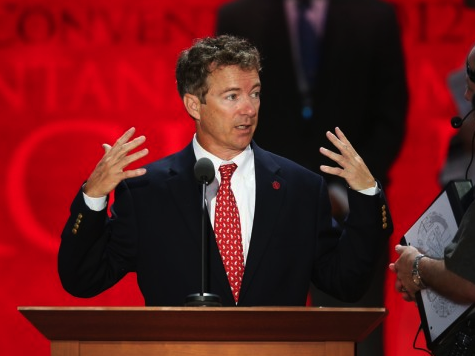Tuesday’s theme at the Republican National Convention was “We Built It,” but the night’s speakers did not reference or mention the Tea Party movement that built the current Republican majority in the House during the 2010 midterm elections and infused a party that seemed all but moribund after the 2008 elections and the latter part of George W. Bush’s presidency with enthusiasm, life, confidence, money, manpower, purpose, and a little swagger.
On Wednesday, Sen. Rand Paul (R-KY), who, like his father, Ron, is one of the most prominent symbols of the Tea Party movement that revolted in part against the spending habits of Republicans and Democrats during the last decade, addressed the RNC.
But even Paul did not explicitly mention or make note, by name, of the Tea Party movement.
This has left many Tea Partiers to wonder if the Romney campaign and the RNC are deliberately trying to disassociate the Republican and Romney brands on the national stage from the Tea Party brand that has given them momentum against Obama. Tea Party members were also perturbed, to say the least, that the RNC passed rules concerning delegate selection and convention rules that stripped power away from the grassroots on Tuesday.
“Their words and their actions speak for themselves,” Jenny Beth Martin, co-founder of the influential Tea Party Patriots wrote. “The term ‘tea party’ appears to have been banned from the convention.”
This strategy is risky for Romney and Republicans for three reasons.
First, 2012 is going to be a base election, and Tea Party voters need to turn out enthusiastically for Romney for him to win. Second, should Romney win, this strategy could potentially create a rift between establishment Republicans and the Tea Party, making it tougher for Romney to govern and push his agenda. Third, should Romney lose, the feud with the Tea Party could potentially cause an even bigger internecine conflict.
On Wednesday, Paul spoke about some of the themes Tea Partiers hold most dear. He discussed how the “explosion of debt is unconscionable and unsustainable” and “Republicans and Democrats must slay their sacred cows” when it comes to military and domestic spending, respectively.
He also talked about his aversion to Obamacare and defending “our God-given rights.”
“We have nothing to fear except our own unwillingness to defend what is naturally ours, our God-given rights,” Paul said. “To thrive we must believe in ourselves again, and we must never — never — trade our liberty for any fleeting promise of security.”
But he did not mention the Tea Party — or its successes — by name.
On Tuesday night, three prominent Tea Party politicians — Texas Senate candidate Ted Cruz, Wisconsin Gov. Scott Walker, and South Carolina Gov. Nikki Haley — addressed the RNC without mentioning or making reference to the Tea Party movement of which they are a part.
Cruz spoke movingly about his father and said that when his dad came to America, “él no tenía nada, pero tenía corazón. He had nothing, but he had heart, a heart for freedom.”
“Something extraordinary is happening, something that has dumbfounded the chattering class,” Cruz said. “What is happening is a Great Awakening.”
The heart (or corazón, as Cruz would say) of this Great Awakening, though, has been the Tea Party movement, and it may be symbolic that the movement’s greatest star — former Alaska Gov. Sarah Palin — is, like any mention or reference to the Tea Party movement, nowhere to be found in Tampa, Florida.
Photo credit: Human Events

COMMENTS
Please let us know if you're having issues with commenting.